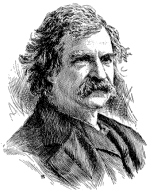The Boys’ Life of Mark Twain
by Paine

LXI. Dictations at Dublin, N. H.
Following his birthday dinner, Mark Twain had become once more the “Belle of New York,” and in a larger way than ever before. An editorial in the “Evening Mail” referred to him as a kind of joint Aristides, Solon, and Themistocles of the American metropolis, and added:
“Things have reached a point where, if Mark Twain is not at a public
meeting or banquet, he is expected to console it with one of his
inimitable letters of advice and encouragement.”
He loved the excitement of it, and it no longer seemed to wear upon him. Scarcely an evening passed that he did not go out to some dinner or gathering where he had promised to speak. In April, for the benefit of the Robert Fulton Society, he delivered his farewell lecture–the last lecture, he said, where any one would have to pay to hear him. It was at Carnegie Hall, and the great place was jammed. As he stood before that vast, shouting audience, I wondered if he was remembering that night, forty years before in San Francisco, when his lecture career had begun. We hoped he might speak of it, but he did not do so.
In May the dictations were transferred to Dublin, New Hampshire, to the long veranda of the Upton House, on the Monadnock slope. He wished to continue our work, he said; so the stenographer and myself were presently located in the village, and drove out each morning, to sit facing one of the rarest views in all New England, while he talked of everything and anything that memory or fancy suggested. We had begun in his bedroom, but the glorious outside was too compelling.
The long veranda was ideal. He was generally ready when we arrived, a luminous figure in white flannels, pacing up and down before a background of sky and forest, blue lake, and distant hills. When it stormed we would go inside to a bright fire. The dictation ended, he would ask his secretary to play the orchestrelle, which at great expense had been freighted up from New York. In that high situation, the fire and the music and the stormbeat seemed to lift us very far indeed from reality. Certain symphonies by Beethoven, an impromptu by Schubert, and a nocturne by Chopin were the selections he cared for most,[12] though in certain moods he asked, for the Scotch melodies.
There was a good deal of social life in Dublin, but, the dictations were seldom interrupted. He became lonely, now and then, and paid a brief visit to New York, or to Mr. Rogers in Fairhaven, but he always returned gladly, for he liked the rest and quiet, and the dictations gave him employment. A part of his entertainment was a trio of kittens which he had rented for the summer–rented because then they would not lose ownership and would find home and protection in the fall. He named the kittens Sackcloth and Ashes–Sackcloth being a black-and-white kit, and Ashes a joint name owned by the two others, who were gray and exactly alike. All summer long these merry little creatures played up and down the wide veranda, or chased butterflies and grasshoppers down the clover slope, offering Mark Twain never-ending amusement. He loved to see them spring into the air after some insect, miss it, tumble back, and quickly jump up again with a surprised and disappointed expression.
In spite of his resolve not to print any of his autobiography until he had been dead a hundred years, he was persuaded during the summer to allow certain chapters of it to be published in “The North American Review.” With the price received, thirty thousand dollars, he announced he was going to build himself a country home at Redding, Connecticut, on land already purchased there, near a small country place of my own. He wished to have a fixed place to go each summer, he said, and his thought was to call it “Autobiography House.”
[12] His special favorites were Schubert’s Op. 142, part 2, and Chopin’s Op. 37, part 2.
 Continue...
Continue...![[Buy at Amazon]](http://images.amazon.com/images/P/B0006AHKG6.01.MZZZZZZZ.jpg)